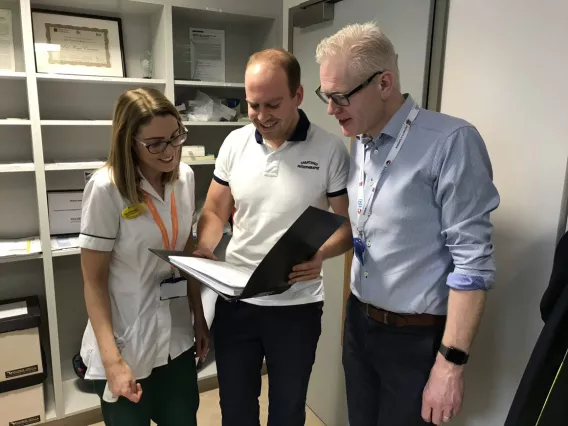Crowding in Emergency Departments (ED) is a growing problem in Ireland and internationally and it is a problem that is likely to continue to increase in the future due to the changing demographics of population internationally: people are living longer and present with more complex healthcare needs.
ED crowding and long waiting times affect healthcare outcomes and patient satisfaction and are also politically important, but a University of Limerick researcher is looking for ways to address this.
Over the past two years, Dr Rose Galvin, a Senior Lecturer in Physiotherapy at UL, led a nationally funded study, OPTIMEND, with a multidisciplinary team of healthcare professionals in the ED at University Hospital Limerick (UHL) to explore a new model of ED care for older people.
UHL treat between 180-220 adults in their ED on a daily basis and older people are among the greatest users of ED services and represent up to 25% of all ED users.
Dr Galvin explains that older adults utilise more healthcare resources, experience longer ED stays and demonstrate higher rates of poorer outcomes following emergency care such as unscheduled return to ED, emergency or unplanned hospitalisation, and even worse, death.
“EDs have traditionally been staffed by doctors and nurses, where doctors were considered the key decision-makers in aspects of patient referral, admission, and discharge.
“Health and social care professionals (HSCPs) such as physiotherapists, occupational therapists, speech and language therapists, medical social workers and clinical pharmacists were called to the ED to consult on an ad hoc basis.
“Increasingly, these HSCPs have extended their scope of practice to work within the ED,” Dr Galvin said, adding that “there is limited high quality evidence exploring the impact of dedicated HSCP teams in the care of older people in the ED.”
However, The OPTIMEND study introduced a dedicated team of HSCPs in the ED to focus on timely assessment and intervention among people aged ≥65 years who attend the ED at UHL.

Dr Damien Ryan, Consultant in Emergency Medicine at UHL led the implementation of the study in the ED at UHL collaboration with Fiona Steed, Group Lead of Allied Health at UL Hospitals Group. The study started in December 2018 and ran through until end of May 2019.
A total of 353 older adults participated in the OPTIMEND study.
Half of these older adults received timely assessment and intervention by the dedicated HSCP team in the ED as well as treatment as usual and the other half of participants just received treatment as usual without any input from the HSCP team.
Key findings from the study demonstrate that several older adults can be safely discharged from the ED following early assessment and intervention by a HSCP team in collaboration with ED medical and nursing staff.
The study also showed that older people who were assessed by the HSCP team spent significantly less time in the ED than those who did not receive HSCP care.
Ide O’Shaughnessy, senior occupational therapist in the ED, summarised the value of the interdisciplinary team.
“We are looking at the same person but with different perspectives and different lens. This collaborative and holistic approach, that is responsive to the changing needs and preferences of older adults, has undoubtedly enhanced the quality of care of those who attend the ED.”
Speaking of future plan, Dr Galvin said that “the OPTIMEND study has been a resounding success in improving the quality, safety and timeliness of care of older adults in the mid-West. We are hoping to build on this success by turning our focus to the enhanced integration of care for older people across the hospital and community setting”.
This model of care was a new venture for the ED at University Hospital Limerick and the Executive team at UL Hospitals Group have funded the HSCP team beyond the duration of the study.
- Andrew Carey
BIO Dr Rose Galvin:
Dr Rose Galvin is a Senior Lecturer in Physiotherapy in the School of Allied Health at the University of Limerick.
Rose has a particular interest in improving the quality and safety of care for older adults and is the theme lead of the Health Services Delivery theme of the Health Research Institute at UL.
Rose is also a fellow of the International Primary Care Research Leadership Programme, hosted by the University of Oxford.
She has over 100 ISI peer-reviewed publications and has supervised over 50 post-graduate students to MSc and PhD completion.
She is Principal Investigator for the Optimend study.and more on Dr galvin can be found here.

About THE HRI
The Health Research Institute (HRI) was established in 2014 to enhance collaboration between and provide support for all researchers interested in every aspect of health research.
The HRI has an emphasis on translational research with four overarching themes (Health Technologies, Health Service Delivery, Lifestyle & Health and Public & Patient Involvement) in which the University already has critical mass and which are aligned with the strategic direction of national and international policies.
The HRI encourages and facilitates multi-disciplinary research across the University and clinical networks.
The OPTIMEND study forms part of the research portfolio at the Ageing Research Centre (ARC), a centre of strategic research interest funded through the Health Research Institute (HRI) at UL. ARC represents a group of interdisciplinary researchers who work across disciplinary boundaries to conduct excellent research that leads to improvement in the health, well-being and social inclusion of older people.
The OPTIMEND study was run through the HRI Clinical Research Support Unit (CRSU) based in University Hospital Limerick.
The HRI CRSU is an integral part of the HRI to support clinical research at a number of sites including the UL campus, UL Hospitals sites and primary community care health settings.
More on the HRI can be found here.
